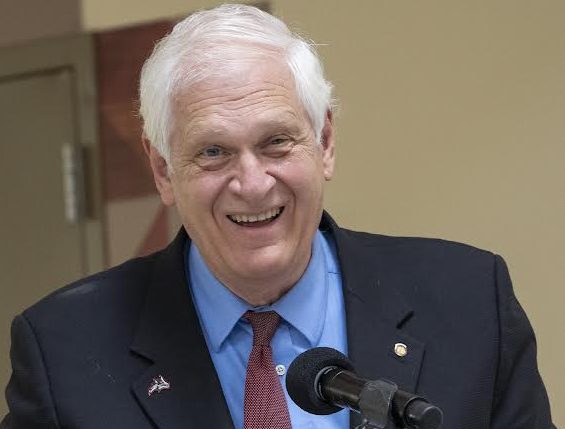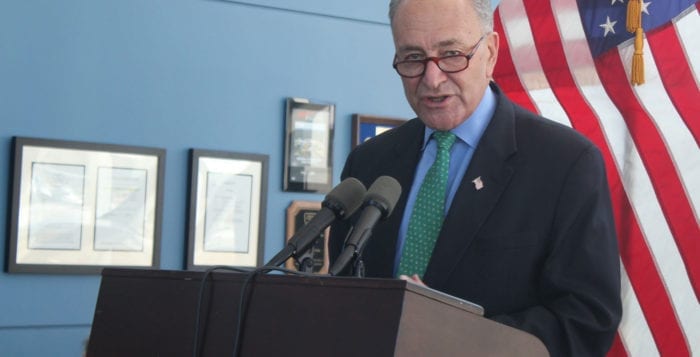The Stony Brook Council at Stony Brook University has honored New York State Assemblyman, faculty member and alumnus Steve Englebright for his championing of higher education, public service and the environment. At a recent ceremony, Assemblyman Englebright received the University Medal, which recognizes his exceptional achievements on behalf of Stony Brook University. Kevin Law, Chair of the Stony Brook Council, presented the award following passage of a resolution by the full Council.
A geologist by training, Assemblyman Englebright received his Master of Science in Geology (Paleontology/Sedimentology) from Stony Brook University in 1975 and has been a contributing member of the Stony Brook University faculty, teaching numerous courses including the Natural History of Long Island.
Englebright was first elected to the Suffolk County Legislature in 1983, where he served until joining the New York State Assembly in 1992. As the State Assemblyman for the 4th Assembly District, he has represented the Long Island community that includes Stony Brook University, Stony Brook Medicine, and the Long Island State Veterans’ Home throughout his entire tenure in the State Legislature.
Assemblyman Englebright’s accomplishments that were recognized include:
-
leading the efforts to preserve the Long Island Pine Barrens by articulating the connection between the preservation of the Pine Barrens ecosystem and protection of the sole source;
-
helping to bring in nearly nearly $5 million towards helping Stony Brook Cancer Center achieve designation as a National Cancer Institute facility by the National Institute of Health;
-
establishing funding to rehabilitate Stony Brook University’s Student Health Center;
-
while leading the Assembly Majority Conference, he demonstrated his passion for the environment and was selected to be the Chairman of the Assembly Environmental Conservation Committee where he was at the forefront of every major environmental policy initiative in the State, including providing:
-
record investment in the Environmental Protection Fund;
-
the creation of the nation-leading Climate Leadership and Community Protection Act;
-
countless initiatives related to renewable energies, consumer safety, sustainability, and water quality protection;
-
policies to protect and promote open space preservation;
-
legislation designating Flax Pond a Tidal Wetland Sanctuary; and
-
millions of dollars of support procured for the New York State Center for Clean Water Technology that facilitated the development of innovative and effective strategies to protect Long Island’s water.
-
The resolution also acknowledged:
-
Assemblyman Englebright has worked closely with past university presidents John H. Marburger III, Shirley Strum Kenney and Samuel L. Stanley, Jr. as well as present President Maurie McInnis, to ensure that the campus was provided with the necessary tools that have enabled Stony Brook University to become one of the State’s Flagship Universities and for Stony Brook Medicine to provide the best in medical research and patient care all across Long Island.
-
Assemblyman Englebright’s efforts and successes on behalf of Stony Brook University go far beyond the noted accomplishments that enhanced the lives of countless students and patients who have benefited from the highest quality education and the best health care on Long Island.
-
Assemblyman Englebright has served the common good, and is hereby recognized for his exceptional achievements on behalf of Stony Brook University.”
“Steve Englebright has always been one of Long Island’s strongest proponents in the areas of the environment and higher education,” said President of the Stony Brook Council Kevin Law. “My association with Assemblyman Englebright has always been a rewarding experience and we share a passion for Stony Brook and the advancement of its role in forging Long Island’s growth.”
“We are incredibly grateful for Assemblyman Steve Englebright’s decades-long advocacy as a public servant in the Suffolk County Legislature and the New York State Assembly that has truly advanced the Stony Brook University community, Long Island and beyond,” said Stony Brook University President Maurie McInnis.
“As Assemblyman Englebright championed issues related to the environment, education, healthcare and so much more, he did so collegially, collaboratively and respectfully. He has always been an admirable role model both inside and outside of the classroom for the many students he has taught and mentored as a member of the Stony Brook faculty. [He] is an extraordinary leader, colleague, alumnus and friend,” she said.






